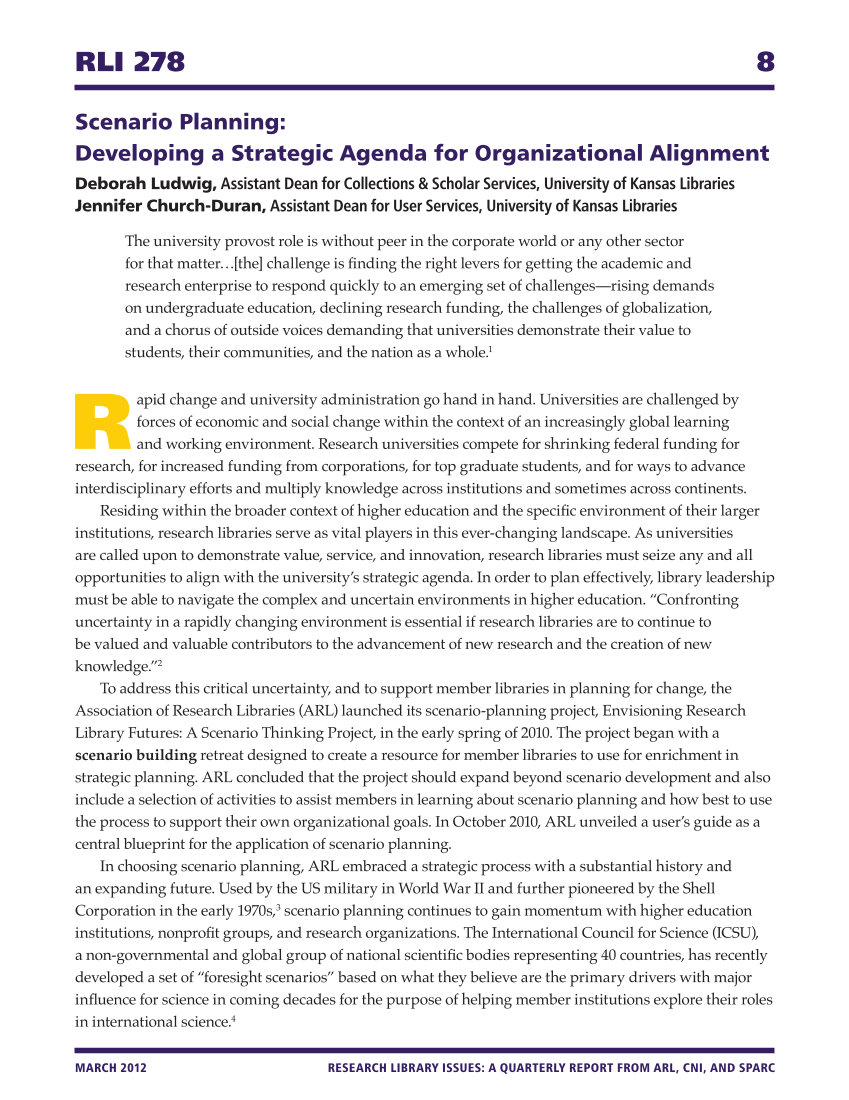RLI 278 8 March 2012R esearch Library Issues: A Quarterly Report from ARL, CNI, and SPARCarc Scenario Planning: Developing a Strategic Agenda for Organizational Alignment Deborah Ludwig, Assistant Dean for Collections & Scholar Services, University of Kansas Libraries Jennifer Church-Duran, Assistant Dean for User Services, University of Kansas Libraries The university provost role is without peer in the corporate world or any other sector for that matter…[the] challenge is finding the right levers for getting the academic and research enterprise to respond quickly to an emerging set of challenges—rising demands on undergraduate education, declining research funding, the challenges of globalization, and a chorus of outside voices demanding that universities demonstrate their value to students, their communities, and the nation as a whole.1 R apid change and university administration go hand in hand. Universities are challenged by forces of economic and social change within the context of an increasingly global learning and working environment. Research universities compete for shrinking federal funding for research, for increased funding from corporations, for top graduate students, and for ways to advance interdisciplinary efforts and multiply knowledge across institutions and sometimes across continents. Residing within the broader context of higher education and the specific environment of their larger institutions, research libraries serve as vital players in this ever-changing landscape. As universities are called upon to demonstrate value, service, and innovation, research libraries must seize any and all opportunities to align with the university’s strategic agenda. In order to plan effectively, library leadership must be able to navigate the complex and uncertain environments in higher education. “Confronting uncertainty in a rapidly changing environment is essential if research libraries are to continue to be valued and valuable contributors to the advancement of new research and the creation of new knowledge.”2 To address this critical uncertainty, and to support member libraries in planning for change, the Association of Research Libraries (ARL) launched its scenario-planning project, Envisioning Research Library Futures: A Scenario Thinking Project, in the early spring of 2010. The project began with a scenario building retreat designed to create a resource for member libraries to use for enrichment in strategic planning. ARL concluded that the project should expand beyond scenario development and also include a selection of activities to assist members in learning about scenario planning and how best to use the process to support their own organizational goals. In October 2010, ARL unveiled a user’s guide as a central blueprint for the application of scenario planning. In choosing scenario planning, ARL embraced a strategic process with a substantial history and an expanding future. Used by the US military in World War II and further pioneered by the Shell Corporation in the early 1970s,3 scenario planning continues to gain momentum with higher education institutions, nonprofit groups, and research organizations. The International Council for Science (ICSU), a non-governmental and global group of national scientific bodies representing 40 countries, has recently developed a set of “foresight scenarios” based on what they believe are the primary drivers with major influence for science in coming decades for the purpose of helping member institutions explore their roles in international science.4
























